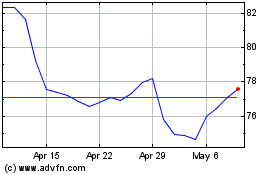WSJ: Alberta Scrambles To Contain Fires As Oil Output Drops
May 17 2011 - 6:45PM
Dow Jones News
Alberta officials scrambled Tuesday to contain dozens of forest
fires that have destroyed hundreds of homes and forced the
evacuation of thousands, and are now shutting down an increasing
amount of the province's oil output.
High winds in the last week have complicated fire fighting,
Alberta officials said. The fires are seasonal and so far aren't
among the province's worst. But unpredictable winds grounded
helicopters and water-bombing aircraft earlier in the week, forcing
one of the most dramatic evacuation's in the province's history.
The 7,000 residents of Slave Lake, about 100 miles north of the
capital here, abandoned the burning town in a matter of hours
Sunday night and Monday morning.
On Tuesday, a parade of oil companies said they had shut down
production as they evacuated staff from the area. Royal Dutch Shell
Group PLC's Canadian division said it would stop production at two
affected fields, which together produced about 10,000 barrels a day
last year.
Canadian Natural Resources Ltd. said it evacuated 1,300 workers
from one of its facilities as fires approached. It said
firefighters had so far protected its site. The company shut down
some oil production in another location because of the proximity of
fires. Pengrowth Energy Corp. said Tuesday it had shut in 5,000
barrels a day of production.
No casualties or injuries have been reported.
Alberta's oil industry was already reeling from slowdowns forced
by a large oil spill on a key pipeline in the province. Plains All
American, the operator of the line, shut a chunk of it down after a
leak earlier this month spilled 28,000 barrels--the worst oil spill
in Canada since 1975. This week, Plains shut down the remainder of
the line due to the wildfires.
It's unclear how much total production has been bottled up by
the fire.
Mel Knight, Alberta's minister of sustainable resource
development, said that 41 fires were raging across the province,
including 12 that were still out of control.
In an interview in his office, Mr. Knight said 1,000
firefighters were battling blazes; more than a dozen water-bombing
aircraft had been deployed; and more than 100 helicopters were
flying fire-fighting sorties.
"We'll get the situation under control," he said.
Residents of Slave Lake were still recovering Tuesday from what
for some turned out to be an all-night scramble to escape towering
flames that surrounded the town.
Early Sunday, authorities had ordered a limited evacuation of
the town. But a sudden wind shift later in the day sent an
out-of-control fire roaring through the community's center and
southern suburbs.
A ribbon of cars and trucks, packed with what few belongings
families could collect, crawled from the town through the night
along the only road that remained open. Officials said a third of
the town's building were destroyed.
On Tuesday, hundreds of miles to the northeast, residents of
Fort MacKay said smoke from a nearby fire had reduced visibility in
the town. Limited evacuations of sick and elderly started early in
the day.
Canadian Natural Resources (NYSE:CNQ)
Historical Stock Chart
From Mar 2024 to Apr 2024

Canadian Natural Resources (NYSE:CNQ)
Historical Stock Chart
From Apr 2023 to Apr 2024
